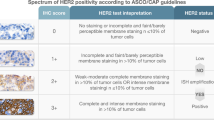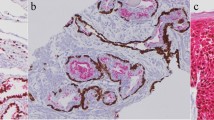Summary
The chemokine receptor CXCR4 is an important factor in the migration, invasiveness, metastasis and proliferation of breast cancer cells. We have retrospectively analyzed the levels of expression of CXCR4 in a large cohort of breast cancers and pre-invasive breast samples linked to clinical data. A total of 1808 invasive breast carcinomas and 214 pre-invasive breast samples could be analyzed in correlation with basic clinico-pathological data such as hormone receptor status, HER2 status and tumor grade. The majority of breast cancers expressed either nuclear or cytoplasmic staining or both. CXCR4 cytoplasmic expression was associated with parameters of tumor aggressivity (tumor grade and lymph node status) and had prognostic value (age-adjusted hazard ratio=1.73; Confidence Interval: 1.07–2.77) with respect to disease-specific survival. CXCR4 positivity in the cytoplasm but not the nucleus was associated with HER2 expression and amplification as well as with hormone receptor negativity (both ER and PR). The percentage of nuclear staining increased from normal breast tissue (20%) to ductal carcinoma-in-situ DCIS (43%) to invasive cancer (67%) while CXCR4 was expressed in the cytoplasm of 67% of (DCIS) cases (double that in normal breast samples), suggesting an important role in breast tumor progression. The CXCR4 receptor is expressed in many breast cancers, justifying its development as a therapeutic target in breast cancer patients. Its cytoplasmic expression is associated with breast tumor progression, suggesting potential value as a diagnostic marker.
Similar content being viewed by others
References
Muller A, Homey B, Soto H, Ge N, Catron D, Buchanan ME, McClanahan T, Murphy E, Yuan W, Wagner SN, Barrera JL, Mohar A, Verastegui E, Zlotnik A, Involvement of chemokine receptors in breast cancer metastasisNature 410:50–56, 2001
Chen Y, Stamatoyannopoulos G, Song CZ, Down-regulation of CXCR4 by inducible small interfering RNA inhibits breast cancer cell invasion in vitroCancer Res 63: 4801–4804, 2003
Lapteva N, Yang AG, Sanders DE, Strube RW, Chen SY, CXCR4 knockdown by small interfering RNA abrogates breast tumor growth in vivoCancer Gene Ther 12: 84–89, 2005
Hall JM, Korach KS, Stromal cell-derived factor 1, a novel target of estrogen receptor action, mediates the mitogenic effects of estradiol in ovarian and breast cancer cellsMol Endocrinol 17: 792–803, 2003
Smith MC, Luker KE, Garbow JR, Prior JL, Jackson E, Piwnica-Worms D, Luker GD, CXCR4 regulates growth of both primary and metastatic breast cancerCancer Res 64: 8604–8612, 2004
Schmid BC, Rudas M, Rezniczek GA, Leodolter S, Zeillinger R, CXCR4 is expressed in ductal carcinoma in situ of the breast and in atypical ductal hyperplasiaBreast Cancer Res Treat 84: 247–250, 2004
Kato M, Kitayama J, Kazama S, Nagawa H, Expression pattern of CXC chemokine receptor-4 is correlated with lymph node metastasis in human invasive ductal carcinomaBreast Cancer Res 5: R144–R150, 2003
Liang Z, Wu T, Lou H, Yu X, Taichman RS, Lau SK, Nie S, Umbreit J, Shim H, Inhibition of breast cancer metastasis by selective synthetic polypeptide against CXCR4Cancer Res 64: 4302–4308, 2004
Li YM, Pan Y, Wei Y, Cheng X, Zhou BP, Tan M, Zhou X, Xia W, Hortobagyi GN, Yu D, Hung MC, Upregulation of CXCR4 is essential for HER2-mediated tumor metastasisCancer Cell 6: 459–469, 2004
Elston CW, Ellis IO, Pathological prognostic factors in breast cancer. I. The value of histological grade in breast cancer: experience from a large study with long-term follow-upHistopathology19: 403–410, 1991
Kononen J, Bubendorf L, Kallioniemi A, Barlund M, Schraml P, Leighton S, Torhorst J, Mihatsch MJ, Sauter G, Kallioniemi OP, Tissue microarrays for high-throughput molecular profiling of tumor specimensNat Med 4: 844–847, 1998
Press MF, Sauter G, Bernstein L, Villalobos IE, Mirlacher M, Zhou JY, Wardeh R, Li YT, Guzman R, Ma Y, Sullivan-Halley J, Santiago A, Park JM, Riva A, Slamon DJ, Diagnostic evaluation of HER-2 as a molecular target: an assessment of accuracy and reproducibility of laboratory testing in large, prospective, randomized clinical trialsClin Cancer Res 11(18):6598–6607, 2005
Haribabu B, Richardson RM, Fisher I, Sozzani S, Peiper SC, Horuk R, Ali H, Snyderman R, Regulation of human chemokine receptors CXCR4. Role of phosphorylation in desensitization and internalizationJ Biol Chem 272: 28726–28731, 1997
Salvucci O, Yao L, Villalba S, Sajewicz A, Pittaluga S, Tosato G, Regulation of endothelial cell branching morphogenesis by endogenous chemokine stromal-derived factor 1Blood99: 2703–2711, 2002
Cabioglu N, Sahin A, Doucet M, Yavuz E, Igci A, Yildirim OE, Aktas E, Bilgic S, Kiran B, Deniz G, Price JE, Chemokine receptor CXCR4 expression in breast cancer as a potential predictive marker of isolated tumor cells in bone marrowClin Exp Metastasis 22: 39–46, 2005
Kang H, Watkins G, Douglas-Jones A, Mansel RE, Jiang WG, The elevated level of CXCR4 is correlated with nodal metastasis of human breast cancerThe Breast 14: 360–367, 2005
Kang H, Watkins G, Parr C, Douglas-Jones A, Mansel RE, Jiang WG, Stromal cell derived factor-1: its influence on invasiveness and migration of breast cancer cells in vitro, and its association with prognosis and survival in human breast cancerBreast Cancer Res 7(4):R402–R410, 2005
Camp RL, Chung GG, Rimm DL, Automated sub-cellular localization and quantification of protein expression in tissue microarraysNat Med 8:1323–1327, 2002
Tarasova NI, Stauber RH, Michejda CJ, Spontaneous and ligand-induced trafficking of CXC-Chemokine Receptor 4J Biol Chem 273: 15883–15886, 1998
Epstein RJ, The CXCL12-CXCR4 chemotactic pathway as a target of adjuvant breast cancer therapiesNat Rev Cancer 4: 901–909, 2004
Hatse S, Princen K, Bridger G, De Clercq E, Schols D, Chemokine receptor inhibition by AMD3100 is strictly confined to CXCR4FEBS Lett527: 255–262, 2002
Hatse S, Princen K, Clercq ED, Rosenkilde MM, Schwartz TW, Hernandez-Abad PE, Skerlj RT, Bridger GJ, Schols D, AMD3465, a monomacrocyclic CXCR4 antagonist and potent HIV entry inhibitorBiochem Pharmacol 70: 752–761, 2005
Tamamura H, Omagari A, Hiramatsu K, Gotoh K, Kanamoto T, Xu Y, Kodama E, Matsuoka M, Hattori T, Yamamoto N, Nakashima H, Otaka A, et al. Development of specific CXCR4 inhibitors possessing high selectivity indexes as well as complete stability in serum based on an anti-HIV peptide T140Bioorg Med Chem Lett 11: 1897–1902, 2001
Acknowledgements
We thank Giovanna Tosato and Louise Quenneville for helpful discussions, Rosanna Nano and Lucy Sierra for technical assistance. Support from Canadian Breast Cancer Research Alliance, Canadian Institutes of Health Research and Quebec Breast Cancer Foundation.
Author information
Authors and Affiliations
Corresponding author
Rights and permissions
About this article
Cite this article
Salvucci, O., Bouchard, A., Baccarelli, A. et al. The role of CXCR4 receptor expression in breast cancer: a large tissue microarray study. Breast Cancer Res Treat 97, 275–283 (2006). https://doi.org/10.1007/s10549-005-9121-8
Received:
Accepted:
Published:
Issue Date:
DOI: https://doi.org/10.1007/s10549-005-9121-8




